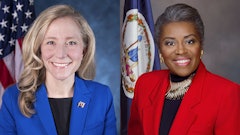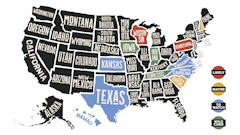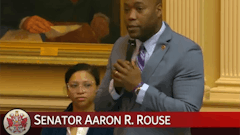
Virginia Democrats and Republican Gov. Glenn Youngkin will continue to clash over cannabis policy in 2025 amid state lawmakers reintroducing bicameral legislation on Jan. 8 to allow for adult-use dispensary sales.
It’s been more than 3 1/2 years since Virginians 21 and older could legally possess and grow cannabis in their homes, but a divided government has plagued the state’s rollout of a commercial retail market since Youngkin assumed office in January 2022.
In the interim, the state’s residents have no in-state access to tested and regulated products, a health and safety concern that lawmakers hope to address in their revived legislation.
Del. Paul Krizek, D-Fairfax, and Sen. Aaron Rouse, D-Virginia Beach, sponsored the sales bill last year, when it passed in both chambers almost entirely along party lines, before Youngkin vetoed the legislation, saying it would endanger Virginia’s health and safety.
“Addressing the inconsistencies in enforcement and regulation in Virginia’s current laws does not justify expanding access to cannabis, following the failed paths of other states and endangering Virginians’ health and safety,” Youngkin wrote in his March 2024 veto statement.
Youngkin said decreased road safety was one of his main concerns with legalizing adult-use dispensary sales.
However, in Ohio, fatal traffic crashes involving cannabis dipped 30% last year, according to Ohio’s State Highway Patrol. This decrease came despite the Buckeye State launching adult-use sales in 2024, debunking one of the many myths often pushed by prohibitionists.
Youngkin also said legalizing dispensary sales does not eliminate the unregulated market nor guarantee product safety
Krizek and Rouse, who reintroduced the sales bill this week in Virginia, don’t see eye-to-eye with the governor.
“We desperately need to address this ongoing proliferation of the illegal pot shops in Virginia and untested and unsafe cannabis that consumers will be using,” Krizek told NPR’s VPM News last month.
Under current law signed by former Democratic Gov. Ralph Northam, Virginians 21 and older can possess up to 1 ounce of cannabis and grow up to four plants per household. But those who want access to cannabis that’s tested for mold, pesticides, heavy metals and other contaminants would need to travel to one of the other 23 adult-use states in the U.S., such as bordering Maryland.
Krizek and Rouse’s bicameral legislation—House Bill 2485 and Senate Bill 970—would establish a framework for an adult-use retail marketplace to be administered by the Virginia Cannabis Control Authority (CCA). More specifically, it would allow licenses to be issued by Sept. 1, 2025, and provides that adult-use sales could commence by May 1, 2026.
That later date is more than five years from when Northam signed the state’s possession and home cultivation bill into law, making Virginia’s potential adult-use program rollout by far the longest in the nation. Maine, which took nearly four years between voters legalizing adult-use cannabis in the November 2016 election and launching adult-use sales in October 2020, currently holds the crown.
Virginia’s reintroduced sales bill would also increase the amount of cannabis that those 21 and older could legally possess from 1 ounce to 2.5 ounces.
In addition, the legislation calls for up to an 11.625% tax on commercial cannabis sales that would be comprised of an 8% state cannabis tax, a 2.5% local tax option and a 1.125% state sales-and-use tax.
After accounting for the CCA’s expenses of running a licensed and regulated cannabis program, the net profits from tax revenues collected would be appropriated as follows:
- 60% to a Cannabis Equity Reinvestment Fund;
- 25% to the Department of Behavioral Health and Development Services for substance-use disorder prevention and treatment programs;
- 10% to pre-kindergarten programs for at-risk 3- and 4-year-olds; and
- 5% to public health programs aimed at preventing drugged driving and underage consumption.
The state’s Cannabis Equity Reinvestment Fund would support people and communities historically and disproportionately targeted by drug enforcement; provide scholarship and other educational opportunities; award grants to support workforce development; and contribute to other equity-focused programs.
Also under the Virginia bill, no county, city or town hall would be allowed to adopt a local ordinance or resolution that prohibits licensed cannabis operations entirely without putting a ballot question before its voters. The governing body of a locality would have to, by resolution, petition its circuit court for a referendum on the question.
Local governments could, however, regulate zoning and land-use requirements for cannabis businesses as well as fixing hours for when dispensaries could sell cannabis products, according to the bill. Also, there would be local control to prohibit cannabis use in public places like parks, playgrounds and sidewalks.
Cultivation licenses as it relates to canopy structures would include five tiers with limits of 2,000, 10,000, 25,000, 45,000 and 70,000 square feet, according to the legislation. The CCA could issue up to 50 licenses for each of the first two tiers (2,000 and 10,000 square feet), up to 10 licenses for the third tier, up to five licenses for the fourth tier and up to 10 licenses for the fifth tier. Outdoor cultivation would be limited to the first two licensing tiers, while indoor cultivation would be allowed for all five.
The state’s existing medical cannabis operators, known as pharmaceutical processors in Virginia, could open five adult-use dispensaries that are co-located with their current medical cannabis retail facilities, according to the bill.
Although it’s unlikely that Youngkin will allow the reintroduced bill to become law without his veto, Krizek told VPM News that Democratic lawmakers shouldn’t just give the governor a “free pass” on this “important” public policy issue.






















